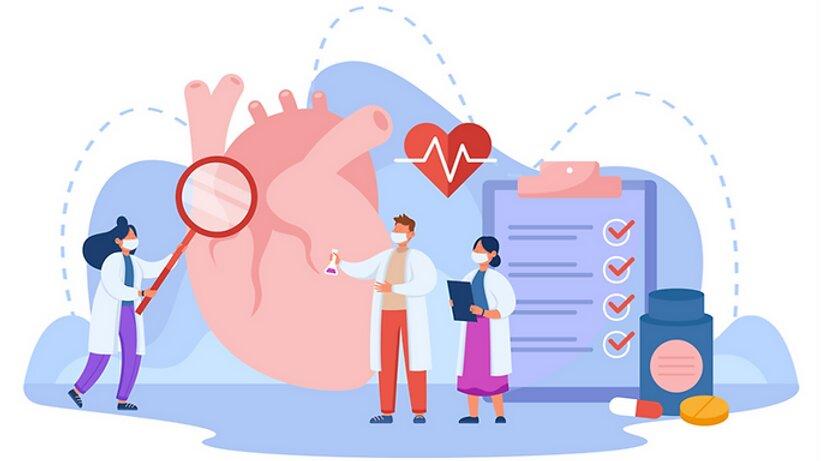- Male
- Ardından: 0 people
Son Güncellemeler
- singapore heart screening
The Importance of Heart Health Screening in Singapore: Ensure Your Well-being with Regular Check-ups
Understanding Heart Health Screening
Heart health screening refers to a comprehensive evaluation of an individual's cardiovascular health. This process involves a series of tests and assessments that provide valuable insights into the condition of the heart and its associated systems. These screenings are designed to identify potential risk factors, detect early signs of heart disease, and enable timely intervention to maintain optimal heart health.
By understanding the importance of heart health screening, individuals can take proactive steps to safeguard their well-being. This screening process often includes various diagnostic tests, such as blood work, electrocardiograms (ECGs), and imaging scans, which help healthcare professionals assess the overall health of the heart and its functioning. Through these screenings, individuals can gain a deeper understanding of their cardiovascular health and make informed decisions about their lifestyle choices and medical treatment, if necessary.
Regular heart health screenings are crucial in Singapore, where heart disease is a leading cause of mortality. By staying informed and proactive about their heart health, individuals can take control of their well-being and reduce the risk of developing life-threatening cardiovascular conditions. This comprehensive approach to healthcare empowers individuals to make informed decisions and prioritize their long-term health and wellness.
The prevalence of Heart Disease in Singapore
Heart disease is a significant public health concern in Singapore. According to the Singapore Heart Foundation, cardiovascular disease is the leading cause of mortality in the nation, accounting for approximately one-third of all deaths each year.
The prevalence of heart disease in Singapore can be attributed to a variety of factors, including the country's aging population, sedentary lifestyles, and the increasing prevalence of risk factors such as obesity, diabetes, and high blood pressure. Additionally, the fast-paced and stressful nature of modern life in Singapore can contribute to the development of cardiovascular problems, as stress and unhealthy coping mechanisms can take a toll on the heart's health.
The impact of heart disease in Singapore extends beyond the individual, as it places a significant burden on the healthcare system and the economy. The cost of treating and managing cardiovascular conditions can be substantial, both in terms of direct medical expenses and indirect costs, such as lost productivity and decreased quality of life. By prioritizing heart health screening and early intervention, Singapore can work towards reducing the prevalence of heart disease and improving the overall well-being of its population.
Read more : https://www.hhscsg.org/heart-health-screening-singaporesingapore heart screening The Importance of Heart Health Screening in Singapore: Ensure Your Well-being with Regular Check-ups Understanding Heart Health Screening Heart health screening refers to a comprehensive evaluation of an individual's cardiovascular health. This process involves a series of tests and assessments that provide valuable insights into the condition of the heart and its associated systems. These screenings are designed to identify potential risk factors, detect early signs of heart disease, and enable timely intervention to maintain optimal heart health. By understanding the importance of heart health screening, individuals can take proactive steps to safeguard their well-being. This screening process often includes various diagnostic tests, such as blood work, electrocardiograms (ECGs), and imaging scans, which help healthcare professionals assess the overall health of the heart and its functioning. Through these screenings, individuals can gain a deeper understanding of their cardiovascular health and make informed decisions about their lifestyle choices and medical treatment, if necessary. Regular heart health screenings are crucial in Singapore, where heart disease is a leading cause of mortality. By staying informed and proactive about their heart health, individuals can take control of their well-being and reduce the risk of developing life-threatening cardiovascular conditions. This comprehensive approach to healthcare empowers individuals to make informed decisions and prioritize their long-term health and wellness. The prevalence of Heart Disease in Singapore Heart disease is a significant public health concern in Singapore. According to the Singapore Heart Foundation, cardiovascular disease is the leading cause of mortality in the nation, accounting for approximately one-third of all deaths each year. The prevalence of heart disease in Singapore can be attributed to a variety of factors, including the country's aging population, sedentary lifestyles, and the increasing prevalence of risk factors such as obesity, diabetes, and high blood pressure. Additionally, the fast-paced and stressful nature of modern life in Singapore can contribute to the development of cardiovascular problems, as stress and unhealthy coping mechanisms can take a toll on the heart's health. The impact of heart disease in Singapore extends beyond the individual, as it places a significant burden on the healthcare system and the economy. The cost of treating and managing cardiovascular conditions can be substantial, both in terms of direct medical expenses and indirect costs, such as lost productivity and decreased quality of life. By prioritizing heart health screening and early intervention, Singapore can work towards reducing the prevalence of heart disease and improving the overall well-being of its population. Read more : https://www.hhscsg.org/heart-health-screening-singapore0 Yorumlar 0 Shares - general gynaecologist
Gynecologists in Singapore: A Guide to Women’s Health
Women’s health is a crucial aspect of overall wellness, and one of the key healthcare professionals that women should have in their corner is a gynecologist. In Singapore, there are many highly qualified gynecologists who are dedicated to providing comprehensive care to women of all ages. In this article, we will take a closer look at gynecologists in Singapore, their roles, and the services they provide.
What is a Gynecologist?
A gynecologist is a medical doctor who specializes in the female reproductive system. They are responsible for diagnosing and treating conditions related to the uterus, ovaries, cervix, and vagina. Gynecologists also provide routine gynecological care, such as Pap smears, breast exams, and contraception advice.
Gynecologists in Singapore
Singapore is home to a thriving medical community, with numerous medical institutions offering world-class care. Gynecologists in Singapore are no exception, and many of them are recognized experts in their field. Singapore gynecologists are known for their advanced medical knowledge, state-of-the-art facilities, and dedication to patient care.
There are many gynecologists in Singapore, both in the public and private sectors. Public sector gynecologists work in government hospitals, such as Singapore General Hospital, National University Hospital, and Changi General Hospital. Private sector gynecologists, on the other hand, work in private hospitals and clinics.
Services Provided by Gynecologists in Singapore
Gynecologists in Singapore provide a wide range of services related to women’s reproductive health. Some of the services provided by gynecologists in Singapore include:
Routine Checkups: Gynecologists in Singapore provide routine checkups for women to monitor their reproductive health. During these checkups, gynecologists typically perform breast exams to check for any lumps or abnormalities, pelvic exams to check for signs of infections, abnormalities, or growths, Pap tests to screen for cervical cancer, and mammograms to screen for breast cancer.
Family Planning: Gynecologists in Singapore provide advice on various methods of birth control, including hormonal and non-hormonal options. They can recommend birth control pills, patches, injections, intrauterine devices (IUDs), and sterilization procedures such as tubal ligation or vasectomy.
Fertility Testing and Treatment: Gynecologists in Singapore can assess a woman’s fertility and provide advice on fertility treatments such as in vitro fertilization (IVF), intrauterine insemination (IUI), and other assisted reproductive technologies (ART). They may also recommend lifestyle changes or medication to help boost fertility.
Read more : https://timothylimclinic.com/general-gynaecology/general gynaecologist Gynecologists in Singapore: A Guide to Women’s Health Women’s health is a crucial aspect of overall wellness, and one of the key healthcare professionals that women should have in their corner is a gynecologist. In Singapore, there are many highly qualified gynecologists who are dedicated to providing comprehensive care to women of all ages. In this article, we will take a closer look at gynecologists in Singapore, their roles, and the services they provide. What is a Gynecologist? A gynecologist is a medical doctor who specializes in the female reproductive system. They are responsible for diagnosing and treating conditions related to the uterus, ovaries, cervix, and vagina. Gynecologists also provide routine gynecological care, such as Pap smears, breast exams, and contraception advice. Gynecologists in Singapore Singapore is home to a thriving medical community, with numerous medical institutions offering world-class care. Gynecologists in Singapore are no exception, and many of them are recognized experts in their field. Singapore gynecologists are known for their advanced medical knowledge, state-of-the-art facilities, and dedication to patient care. There are many gynecologists in Singapore, both in the public and private sectors. Public sector gynecologists work in government hospitals, such as Singapore General Hospital, National University Hospital, and Changi General Hospital. Private sector gynecologists, on the other hand, work in private hospitals and clinics. Services Provided by Gynecologists in Singapore Gynecologists in Singapore provide a wide range of services related to women’s reproductive health. Some of the services provided by gynecologists in Singapore include: Routine Checkups: Gynecologists in Singapore provide routine checkups for women to monitor their reproductive health. During these checkups, gynecologists typically perform breast exams to check for any lumps or abnormalities, pelvic exams to check for signs of infections, abnormalities, or growths, Pap tests to screen for cervical cancer, and mammograms to screen for breast cancer. Family Planning: Gynecologists in Singapore provide advice on various methods of birth control, including hormonal and non-hormonal options. They can recommend birth control pills, patches, injections, intrauterine devices (IUDs), and sterilization procedures such as tubal ligation or vasectomy. Fertility Testing and Treatment: Gynecologists in Singapore can assess a woman’s fertility and provide advice on fertility treatments such as in vitro fertilization (IVF), intrauterine insemination (IUI), and other assisted reproductive technologies (ART). They may also recommend lifestyle changes or medication to help boost fertility. Read more : https://timothylimclinic.com/general-gynaecology/0 Yorumlar 0 Shares - Fengshui singapore
Strategic Fengshui 101
Fengshui – is it science or a form of art? Commonly known as Chinese geomancy, this ancient practice of creating harmony and balance in living spaces has been in place for thousands of years, from tiny homes to offices, buildings and cityscapes.
Today, fengshui continues to gain popularity with people around the world and we are here to share some insightful fengshui principles that go beyond Yin and Yang, and the Five Elements.
Learn and grow with fengshui as a better part of your life! Way Academy’s upcoming Fengshui Course 2023 is now open for registration. Enquire now!
What is fengshui?
Literally translated as “wind” and “water”, fengshui is a practice of creating living spaces that are in balance with one’s surroundings. This was based on the fundamental belief that the earth’s energies influence people, which was an ideology recognised by many ancient cultures.
The relationships of people with natural and built environments are influenced by many elements such as electromagnetics and radio waves, natural earth energies, way of building, building materials, systems and design, etc.
The ancient Chinese recognised this, and the concept of fengshui took root under the practice of Taoism – a Chinese philosophy that advocates the way of nature. Everything encompasses qi, or life force, which is made up of Yin and Yang elements.
Just like the sun and moon, Yin and Yang refers to opposing but complementary forces that cannot be separated. The core of fengshui lies in balancing Yin and Yang, garnering positive qi while minimising negative energies in one’s environment.
At Way Fengshui, we define fengshui as the study of an individual and his relationship to his environment. By observing the flow of qi or energy in our surroundings and the effects it has on people, we can design spaces, plan environments, and select the best dates that work for them.
Different schools of fengshui [门派]
So, how does one go about understanding fengshui or determining fengshui conditions? There are actually several schools of fengshui, each with its own principles and methods. Some of the main schools are:
Form School Fengshui [形势派]: Relying mainly on landforms and shapes of the environment to analyse fengshui conditions. Also known as Classical fengshui, this school uses the four cardinal directions and the Four Celestial Animals (Green Dragon, White Tiger, Red Phoenix, Black Turtle) to guide the placement of buildings and objects.
Compass School Fengshui [理气派]: This fengshui school uses a special compass called a Luo Pan to measure the magnetic directions and the energy patterns of a space. It divides the space into eight sectors, each associated with a trigram, an element, a number, and a life aspect.
Eight Mansions Fengshui [八宅派]: The auspiciousness of fengshui is determined by the orientation and layout of the residence. In Eight Mansions, the home orientation should match the Bazi of the occupants, and the home layout should have a balance of the Five Elements.
Read more : https://www.wayfengshui.com/things-to-know-about-period-9-in-fengshui/Fengshui singapore Strategic Fengshui 101 Fengshui – is it science or a form of art? Commonly known as Chinese geomancy, this ancient practice of creating harmony and balance in living spaces has been in place for thousands of years, from tiny homes to offices, buildings and cityscapes. Today, fengshui continues to gain popularity with people around the world and we are here to share some insightful fengshui principles that go beyond Yin and Yang, and the Five Elements. Learn and grow with fengshui as a better part of your life! Way Academy’s upcoming Fengshui Course 2023 is now open for registration. Enquire now! What is fengshui? Literally translated as “wind” and “water”, fengshui is a practice of creating living spaces that are in balance with one’s surroundings. This was based on the fundamental belief that the earth’s energies influence people, which was an ideology recognised by many ancient cultures. The relationships of people with natural and built environments are influenced by many elements such as electromagnetics and radio waves, natural earth energies, way of building, building materials, systems and design, etc. The ancient Chinese recognised this, and the concept of fengshui took root under the practice of Taoism – a Chinese philosophy that advocates the way of nature. Everything encompasses qi, or life force, which is made up of Yin and Yang elements. Just like the sun and moon, Yin and Yang refers to opposing but complementary forces that cannot be separated. The core of fengshui lies in balancing Yin and Yang, garnering positive qi while minimising negative energies in one’s environment. At Way Fengshui, we define fengshui as the study of an individual and his relationship to his environment. By observing the flow of qi or energy in our surroundings and the effects it has on people, we can design spaces, plan environments, and select the best dates that work for them. Different schools of fengshui [门派] So, how does one go about understanding fengshui or determining fengshui conditions? There are actually several schools of fengshui, each with its own principles and methods. Some of the main schools are: Form School Fengshui [形势派]: Relying mainly on landforms and shapes of the environment to analyse fengshui conditions. Also known as Classical fengshui, this school uses the four cardinal directions and the Four Celestial Animals (Green Dragon, White Tiger, Red Phoenix, Black Turtle) to guide the placement of buildings and objects. Compass School Fengshui [理气派]: This fengshui school uses a special compass called a Luo Pan to measure the magnetic directions and the energy patterns of a space. It divides the space into eight sectors, each associated with a trigram, an element, a number, and a life aspect. Eight Mansions Fengshui [八宅派]: The auspiciousness of fengshui is determined by the orientation and layout of the residence. In Eight Mansions, the home orientation should match the Bazi of the occupants, and the home layout should have a balance of the Five Elements. Read more : https://www.wayfengshui.com/things-to-know-about-period-9-in-fengshui/0 Yorumlar 0 Shares
Daha Hikayeler




